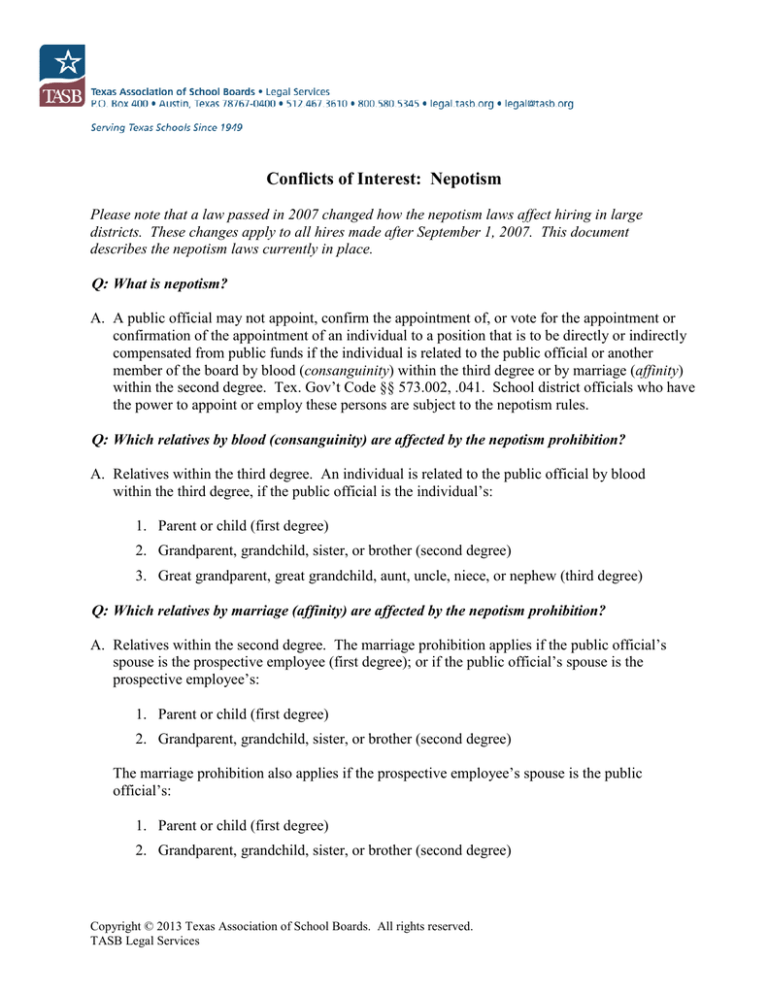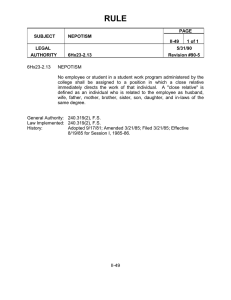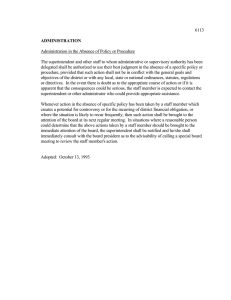
Conflicts of Interest: Nepotism
Please note that a law passed in 2007 changed how the nepotism laws affect hiring in large
districts. These changes apply to all hires made after September 1, 2007. This document
describes the nepotism laws currently in place.
Q: What is nepotism?
A. A public official may not appoint, confirm the appointment of, or vote for the appointment or
confirmation of the appointment of an individual to a position that is to be directly or indirectly
compensated from public funds if the individual is related to the public official or another
member of the board by blood (consanguinity) within the third degree or by marriage (affinity)
within the second degree. Tex. Gov’t Code §§ 573.002, .041. School district officials who have
the power to appoint or employ these persons are subject to the nepotism rules.
Q: Which relatives by blood (consanguinity) are affected by the nepotism prohibition?
A. Relatives within the third degree. An individual is related to the public official by blood
within the third degree, if the public official is the individual’s:
1. Parent or child (first degree)
2. Grandparent, grandchild, sister, or brother (second degree)
3. Great grandparent, great grandchild, aunt, uncle, niece, or nephew (third degree)
Q: Which relatives by marriage (affinity) are affected by the nepotism prohibition?
A. Relatives within the second degree. The marriage prohibition applies if the public official’s
spouse is the prospective employee (first degree); or if the public official’s spouse is the
prospective employee’s:
1. Parent or child (first degree)
2. Grandparent, grandchild, sister, or brother (second degree)
The marriage prohibition also applies if the prospective employee’s spouse is the public
official’s:
1. Parent or child (first degree)
2. Grandparent, grandchild, sister, or brother (second degree)
Copyright © 2013 Texas Association of School Boards. All rights reserved.
TASB Legal Services
Page 2
A relationship by marriage extends only to blood relatives of a board member’s spouse and
the spouses of a board member’s blood relatives. It does not include a relative-in-law of
board member’s spouse.
Q: Who is considered a “public official” under the nepotism prohibition?
A. For nepotism purposes, a public official of a school district is a member of the school board
or an officer of the school district. Tex. Gov’t Code § 573.001(3). Depending on the county
population and your district’s delegation of hiring authority (see below) the term public
official could include school board trustees, the superintendent, and sometimes both.
Q: When is the superintendent a “public official” for the purposes of the nepotism prohibition?
A. A superintendent is a public official for purposes of nepotism if he or she has final hiring
authority for the employment position. The Texas Education Code permits a school board to
delegate some or all of its hiring authority to the superintendent. Tex. Educ. Code §
11.1513(a)(2). Commonly, this delegation of hiring authority is limited to at-will employees.
If the school board has delegated hiring authority, the superintendent is subject to the
nepotism laws to the extent of that delegation. If, for example, a board delegated final hiring
authority for at-will employees to a superintendent, the superintendent could not hire his wife
for an at-will position at the district. The board, however, could hire the superintendent’s
wife for a contract position.
To the extent the board has retained hiring authority, the superintendent is merely an
employee or agent and is not a public official subject to prohibitions under the nepotism
statutes. Pena v. Rio Grande Consol. Indep. Sch. Dist., 616 S.W.2d 658 (Tex. Civ. App.—
Eastland 1981, no writ).
Q: When is a trustee a “public official” for the purposes of the nepotism prohibition?
A. Generally, a trustee is always going to be a public official for nepotism purposes. Therefore,
the school district in which the trustee serves is not allowed to hire a trustee’s relative within
a prohibited degree of relationship.
A limited exception to this definition of public official applies only to districts in “small
counties,” counties with a population of fewer than 35,000 people. For districts in small
counties, the term public official does not include a school board trustee when the
superintendent is filling an employment position for which the superintendent has hiring
authority. Tex. Educ. Code § 11.1513(a), (f)-(g).
Copyright © 2013 Texas Association of School Boards. All rights reserved.
TASB Legal Services
Page 3
Q: What constitutes a “small county” for the purpose of the nepotism prohibition?
A. A small county is one with a population of fewer than 35,000 people. According to the law,
the nepotism prohibition does not apply to a relative of a trustee if the board delegates hiring
authority to the superintendent and the school district is either completely within a county
with a population of fewer than 35,000, or in more than one county, if the county in which
the largest portion of the school district is located has a population of fewer than 35,000.
Tex. Educ. Code § 11.1513(g).
The charts below explain the application of the nepotism laws in both large and small counties:
Large Counties
Because board members of districts in large counties, those with a population of 35,000 or
greater, remain public officials regardless of the delegation of any hiring authority to the
superintendent, those districts may not hire relatives of board members unless an exception
applies.
This chart shows whether or not a district in a large county may hire relatives of the
superintendent.
The board retains all hiring authority
The board has delegated hiring
authority for at-will employees to the
superintendent
The board has delegated all hiring
authority to the superintendent
If the position is atwill:
Yes
If the position is
under contract:
Yes
No
Yes
No
No
Copyright © 2013 Texas Association of School Boards. All rights reserved.
TASB Legal Services
Page 4
Small Counties
This chart shows whether or not a district in a small county, those with a population of fewer than
35,000, may hire relatives of board members.
The board retains all hiring
authority
The board has delegated
hiring authority for at-will
employees to the
superintendent
The board has delegated all
hiring authority to the
superintendent
If the position is at-will:
If the position is
under contract:
No
No
Yes
No
Yes
Yes
This chart shows whether or not a district in a small county may hire relatives of the
superintendent.
The board retains all hiring
authority
The board has delegated
hiring authority for at-will
employees to the
superintendent
The board has delegated all
hiring authority to the
superintendent
If the position is at-will:
If the position is
under contract:
Yes
Yes
No
Yes
No
No
Q: Are there any employment situations in which the nepotism prohibition is not applicable?
A. Yes. The Texas Government Code sets forth several exceptions to the nepotism rules,
including continuous employment, bus drivers in counties with a population under 35,000,
substitute teachers, and persons not under board control.
Copyright © 2013 Texas Association of School Boards. All rights reserved.
TASB Legal Services
Page 5
Q: What is the “continuous employment” exception?
A. The nepotism prohibition does not apply to a related individual who was employed for a
specified time before the election or appointment of the public official. Tex. Gov’t Code §
573.062(a)(1). The related individual’s prior employment must be continuous for at least:
1. thirty days if the public official is appointed, or
2. six months if the public official is elected.
Tex. Gov’t Code § 573.062(a)(2).
The attorney general has interpreted this exception to apply only to employment uninterrupted
in time, connected, and unbroken. Op. Tex. Att’y Gen. No. JC-185 (2000). Any separation
from employment will break the chain of continuity and make the exception inapplicable. For
example, if a teacher who is related to a board member retires, the district cannot rehire that
teacher. Tex. Att’y Gen. LO-96-015 (1996); Op. Tex. Att’y Gen. No. JC-442 (2001).
For board member’s spouses who are employed by the school district, the attorney general
opined that the continuous employment period begins on the first day the board member’s
spouse is employed by the school district and ends on the date the board member assumes
office. Op. Tex. Att’y Gen. No. GA-1016 (2013).
If a board member’s relative works for the district under the continuous employment
exception, the related board member must abstain from participating in any deliberations or
voting on actions that affect only the board member’s relative. The requirement to abstain
does not apply to board decisions involving a class or category of employees to which the
board member’s relative belongs. Tex. Gov’t Code § 573.062(b).
Q: If a trustee resigns can the board then hire the trustee’s relative?
A. A former trustee’s relative can be hired only if the trustee’s successor has been sworn into
office. The holdover doctrine provides that all public officers shall continue to perform the
duties of their offices until their successors shall be duly qualified (i.e., sworn in). Until the
vacancy created by a trustee’s resignation is filled by a successor, either by appointment or
election, the trustee legally continues to serve and have the duties and powers of office.
Therefore, a board still may not employ the trustee’s relative until the trustee’s position is
filled. Tex. Const. art. XVI, Sec. 17; Op. Tex. Att’y. Gen. Nos. DM-2 (1991), JM-636 (1987).
Q: What are the consequences of violating the nepotism prohibition?
A. An intentional or knowing violation of the nepotism statute is a misdemeanor punishable by a
fine not less than $100 or more than $1000. Tex. Gov’t Code § 573.084. In addition, an
individual who violates the nepotism law may be removed from office, and no compensation
may be paid to an ineligible employee-relative. Tex. Gov’t Code §§ 573.081-.083.
Copyright © 2013 Texas Association of School Boards. All rights reserved.
TASB Legal Services
Page 6
Q: What TASB policies apply?
A. For more information, please see TASB Policies BBB(LEGAL), DBE(LEGAL),
DC(LEGAL), DC(LOCAL), DCD(LEGAL), and BBC(LEGAL).
Where can I get more information on nepotism as applied to board trustees?
A. For more information on this or other legal topics, please call the TASB Legal Line at 800580-5345. The TASB Legal Line is staffed by TASB Legal Services attorneys and is
available to all school district trustees and administrators. Additional legal resources are
available at the TASB School Law eSource at schoollawesource.tasb.org and for purchase at
the TASB Store at www.tasb.org/store.
In addition, the Texas Attorney General published and periodically updates a book on official
conflicts entitled Public Officers: Traps for the Unwary.
This document is provided for educational purposes only and contains information to facilitate a general
understanding of the law. It is not an exhaustive treatment of the law on this subject nor is it intended to substitute for
the advice of an attorney. Consult with your own attorneys to apply these legal principles to specific fact situations.
Updated by TASB Legal Services, September 2013
Copyright © 2013 Texas Association of School Boards. All rights reserved.
TASB Legal Services


